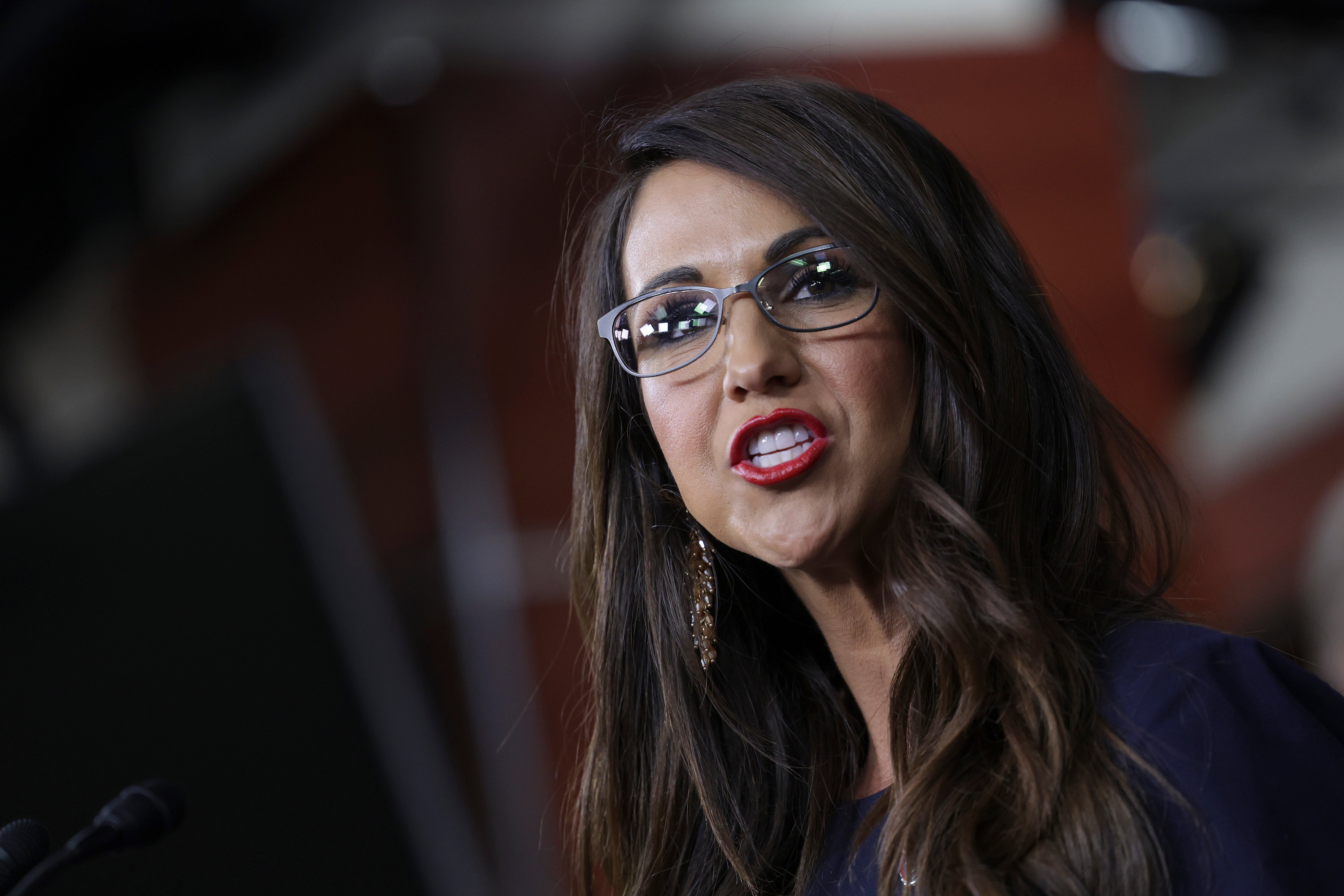
Imagine you have just purchased Republican Representative Lauren Boebert's new autobiographical book, "My American Life."
You rush to her restaurant, Shooter's Bar and Grill, to begin flipping through its pages. A waitress — pistol dangling from a holster on her hip — drops a menu on the table. You glance over it, your eyes stopping at the pork sliders. The fake news says they gave concert-goers diarrhea back in 2017. But you didn't come all this way, to Rifle, Colorado, for lies. You want the truth — and it's sitting right there in your hands. You dive in.
Its early chapters follow Ms Boebert through her childhood, one marked by struggles with poverty and a young mother — who was allegedly pressured to abort her by her biological father — who was more of a friend than a parent.
Despite this, Ms Boebert is raised by both her mother and her grandparents, who instill the values of God, guns and America in her from a young age. These core conservative American ideals are harkened to numerous times in the first chapter and linger over the remainder of the book.
We get glimpses at her early life, including a bad relationship with a toxic step-father and her excitement for her first job slinging burgers at McDonalds. But it isn't long before the book's true purpose as a vehicle for MAGA ideology becomes unambiguously clear.
After the Jesus, guns, and flag-waving heavy introduction, she eventually begins discussing her mother's reliance on welfare. This is a talking point Ms Boebert has touched on frequently during her time in politics. But she laments the welfare system and, while agreeing that social safety nets are necessary, argues that the US system encourages government dependence.
She praises her mother for eventually getting a job and getting off assistance, celebrating the liberation as a victory over Democrats who, she believes, want to keep the public suckling from the teat of social programmes in order to control them. It is somewhat bizarre that Ms Boebert takes this view, though, as her mother using welfare as a safety net until she was stable enough to find gainful employment and leave the system is actually precisely how the programme is intended to work. If anything her mother is a poster child for the efficacy of the system. But she does not see it that way.

We learn about Ms Boebert's first meeting with her husband, which she says "Hollywood couldn't have scripted" any better. He was 22 and hit on her, age 16 at the time, at a Burger King.
"From that moment Jayson Boebert and I have been together," she writes.
She assures us her mother was fine with the arrangement and warns any "Karens" reading the book that they broke no Colorado laws while they were dating.
This section of the book also contains Ms Boebert's version of a now-infamous story about her husband allegedly showing his penis to a minor at a bowling alley. She claims that her step-father and husband went bowling to bond, and that a bartender — who had heard whispers of Mr Boebert's much-talked-about genital tattoo — pestered him to show it to her.
Drunk and allegedly upset at the lewd requests made by this woman, Mr Boebert stood up and "acted like", in Ms Boebert's words, he was going to unzip his pants. The police get involved, the woman turns out to be a minor, and Mr Boebert gets arrested for indecent exposure to someone under the age of 18.
Ms Boebert insists that he never exposed himself and explains away his guilty plea by claiming he was "without a lawyer or the desire to hire one". So rather than defend himself in court he took a deal.

According to the women involved in the incident, Mr Boebert had been "harassing" one of them all night and approached them before showing off his ink, which made them angry and prompted the police incident.
The book isn't all about Ms Boebert's run-ins with the law — though there is an entire chapter dedicated to those, called "Pretty Little Mugshots”.
She discusses motherhood and later facing home foreclosure during the 2009 financial crisis.
It's during these early personal chapters where Ms Boebert feels relatable, at least to those outside of her political tribe. She faces financial hurdles and adapts to motherhood and joins a group — in her case a church prison ministry — to find a way to engage with her community.
The second half of the book details Ms Boebert's entrance into politics, beginning with her work to counter a popular vote initiative, and leading to her first meeting with the man she would eventually primary, Republican Congressman Scott Tipton. She described him as being "soft spoken" and said he "lacked a fire in his belly”.
She dedicates an entire chapter to her feud with Beto O'Rourke, explaining the circumstances leading up to her confrontation with him during a campaign stop — an event that launched her into the mainstream political consciousness.
Conspiracy theories snake their way through both the personal and political sections of the book, from run-of-the-mill MAGA talking points about the 2020 election to claims that the "fake news" is guided by opposition research and polling firms, rather than a desperate bid for people's eyeballs.

Ms Boebert explains her relationship to the QAnon conspiracy movement in a later chapter, recalling an interview she did in which she said she hoped that the cult-like conspiracy movement was real because "it could only mean America was getting stronger and people were returning to conservative values”.
As a reminder, QAnon adherents believe Satan-worshipping paedophiles secretly run the US and drink children's adrenal secretions before sacrificing them. QAnon believers always remind each other to "trust the plan”, a kind of "may the Force be with you" mantra meant to assure their fellow travelers that yes, one day the secret government whistleblower called Q, Donald Trump, and the resurrected JFK Jr will lead glorious show tribunals and mass executions of their political enemies.
Anyway, Ms Boebert said she hoped that QAnon was real. Of course, later in the chapter she claimed she had no idea what the movement actually was, a defence Mr Trump would later rely upon when asked to denounce the movement.

The MAGA leader himself, Mr Trump, eventually enters the picture when he invites Ms Boebert to meet him at Mount Rushmore.
She recalled his introduction as such: "Melania, this is the girl I was telling you about. The one who won by 10 points. The one who carries a gun in her restaurant. Lauren, real guns?" Ms Boebert recalled the then-president saying. She said she replied "Yes, Melania, real guns!"
She was excited to meet Mr Trump despite the fact that he backed Mr Tipton in their primary contest. But she was a winner, and that made her acceptable to the former president.
By this point in the book, it could have been written by Congressman Matt Gaetz or Representative Marjorie Taylor Greene. Some details might be different, but the stories are all the same — praising Mr Trump, denouncing Democrats, parroting election fraud lies, defending their actions during the Capitol riot.
Ms Boebert comes across as a colourful, sometimes relatable, sometimes detestable character in the early chapters of the book, but the closer she gets to politics, the more she fades. By the time she beats Mr Tipton, she is no different than Mr Gaetz or Ms Greene or former Congressman Madison Cawthorn; a vessel for an extremist political ideology plucked from obscurity by a powerful institution.







